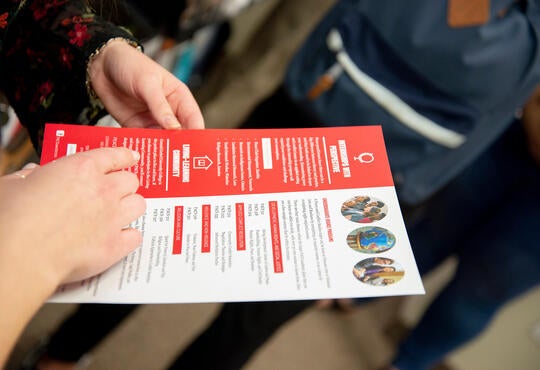Where do we go to talk about our everyday traumatic experiences that we do not believe are worthy of sharing? In “Not Traumatic Enough for a Shock Blanket exhibit,” Yasmeen Nematt Alla explores this question, and how art spaces can become gestures of care to those who feel unworthy of their trauma. Just as shock blankets are wrapped around the shoulders of survivors in emergencies, this exhibit invites viewers to consider the importance of trauma-informed community spaces and how they can heal us and hold us.
As Coordinator of the Centre for Peace Advancement, I have had the privilege of partnering on exhibits with fifteen artists and community organizations over the past five years. I also teach sessionally with Grebel’s Peace and Conflict Studies department, and my course deals heavily with themes that include psychosocial trauma and community healing. Although every exhibit hosted in the Grebel Gallery is chosen with care and enthusiasm, once in a while an exhibit will intersect with my own academic interests. This is one of those rare moments and, as such, the question behind this exhibit—and its compelling origin story—has captivated me.
During the influx of Syrian refugees into the Waterloo Region in 2016, Yasmeen volunteered as a document translator. In the course of her work, she noticed a gap between people’s lived experiences of trauma and their willingness to name their experience as traumatic. This observation also reflected what she saw in her community more broadly. Yasmeen’s art practice took a new thematic direction as she began considering how artistic spaces might act as gestures of care that allow for trauma to be shared and appreciated for its significance.
In a social media post last year, Yasmeen invited her social network further into her exploration. She shared the following invitation on Instagram: “For an art project, will you share with me an experience that you start telling by using the words, ‘It’s not traumatic, but....’” In exchange for that emotional labour, she shares her own not-so-traumatic experience with the reader.
Yasmeen was shocked when her inbox was flooded with over 90 responses in the coming weeks, many of which were from individuals who were sharing their story for the first time. Yasmeen is still receiving stories to this day.
The response of Yasmeen’s social network points to the need for spaces to tell our stories. It also reflects clinical research on trauma healing. Judith Herman, psychiatrist and author of Trauma and Recovery: The Aftermath of Violence--From Domestic Abuse to Political Terror, speaks to the vital role communities play in both the individual and collective healing of trauma. According to the author, trauma deeply impacts both our individual psychology and our sense of self in relation to the world. As a result, “sharing the traumatic experience with others is a precondition for the restitution of a sense of a meaningful world,” she said. Without spaces to tell our stories, how do we do the challenging work of reweaving our identity and relationship to the world?
I believe that in order for people to understand that their traumatic experiences are valid and worthy of sharing, we need trauma-informed spaces that are able to receive these narratives. How might our education, health care, and criminal justice systems shift to better reflect the realities of how trauma manifests and how healing happens?
“Not Traumatic Enough for a Shock Blanket”—set to open when Grebel opens again— includes 20 distinct pieces, each taking the form of an orange fleece shock blanket, holding an abstracted excerpt from the stories shared with Yasmeen Nematt Alla. These pieces speak to one another as well as to the community, inviting a larger conversation about care, belonging, and healing.
Free tours of this exhibit will be available to classes and community groups of 3 or more people. Email michelle.jackett@uwaterloo.ca






